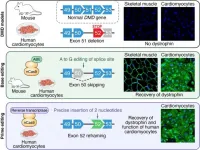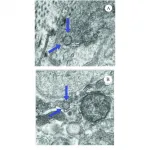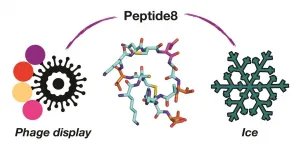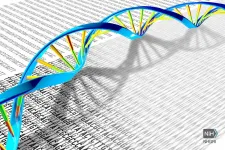INFORMATION:
AI analytics predict COVID-19 patients' daily trajectory in UK intensive care units
2021-05-11
(Press-News.org) The investigators used machine learning to predict which patients might get worse and not respond positively to being turned onto their front in intensive care units (ICUs) - a technique known as proning that is commonly used in this setting to improve oxygenation of the lungs.
While the AI model was used on a retrospective cohort of patient data collected during the pandemic's first wave, the study demonstrates the ability of AI methods to predict patient outcomes using routine clinical information used by ICU medics.
The researchers say the approach, where each patient's data were analysed day-by-day instead of only on admission, could be used to improve guidelines in clinical practice going forward. It could be applied to potential future waves of the pandemic and other diseases treated in similar clinical settings.
This is the first study that examines daily COVID-19 patient data, using AI to understand the clinical response to the rapidly changing needs of patients in ICUs. Led by a team from Imperial College London and Royal Brompton and Harefield hospitals for the COVID-ICU Consortium, the research is published today in the journal Intensive Care Medicine.
First author and clinical science lead Dr Brijesh Patel, from Imperial's Department of Surgery & Cancer and senior intensivist at Royal Brompton Hospital, said: "Most studies look at the health of a patient on admission to ICU, and whether they were discharged or sadly died. In ICU there is a huge amount of information which we use at the bedside to manage patients on a day-by-day basis, and our study focuses on how the patients' state changed daily.
"This helped focus our attention on which specific parameters matter the most, and how the importance of each parameter changes over time. This dynamic understanding is vitally important when trying to understand a new life-threatening disease and to know when and in whom each intervention works."
The prone position is used in ICUs to help improve blood oxygenation in people with severe acute respiratory distress syndrome, and has been used extensively during the pandemic. However, proning did not help all COVID-19 patients and, when used in patients who will not benefit, can delay the start of other sequential treatments like using extracorporeal membrane oxygenation (ECMO), a life-support machine that takes over for the heart and lungs to oxygenate blood and pump it round the body. Better analysis of proning implementation and prediction of failed proning could lead to more personalised applications.
Dr Patel said: "ECMO is currently the last resort for many patients, after all other less invasive interventions such as prone position have failed, but it has associated risks. Over 20% of all patients on a mechanical ventilator were referred to and received management advice from one of the five national ECMO centres. Patients appropriately placed early onto ECMO show better outcomes. However, only 4% of referred patients received ECMO, which is due to a number of reasons, but one of which could have been delays in assessment of responsiveness to interventions like prone position.
"Advanced analytics to enable tracking of disease allows patient care to be streamlined so that the window of opportunity for any intervention is not missed. The data from this national evaluation enabled us not only to examine how our management decisions affected disease course but importantly where we could improve."
The new findings show that the AI model identified factors that determined which patients were likely to get worse and not respond to interventions like proning. The researchers found that during the first wave of the pandemic, patients with blood clots or inflammation in the lungs, lower oxygen levels, lower blood pressure, and lower lactate levels were less likely to benefit from being proned. Overall, proning improved oxygenation in only 44% of patients.
Senior author and data science lead Professor Aldo Faisal, Director of Imperial's Centre in AI for Healthcare at the Departments of Computing and Bioengineering said: "In the ever-changing landscape of the pandemic, clinicians are constantly learning and adapting to patient needs, which themselves change every day. Critically, we have set up a standing digital service evaluation of UK ICUs, getting day-by-day treatment data from ICUs across the nations. Our machine learning tool could help track patient progress in real time and help inform ICU guidelines by filling the gaps of patient care - reflecting back to clinicians to identify best practice quickly and benefit from sharing.
"More than one year on, we're still learning how the course of COVID-19 affects the body, and how this can change day-by-day. Data science and the daily data feeds from ICUs across the country help us learn much faster how best to treat individual patients based on their daily symptoms and needs."
The researchers analysed data from 633 mechanically ventilated COVID-19 patients across 20 UK ICUs during the first wave of the COVID-19 outbreak (1 March - 31 August 2020). They examined the importance of factors associated with disease progression, like blood clots and inflammation in the lungs, as well as treatments given and whether the patient ultimately died or was discharged.
They used this data, which was collected daily by legions of medical students, nurses, doctors, audit, research and data staff, to design and train the AI tool which then made predictions on factors that determine outcomes.
Dr Patel added: "Our findings could help inform ICU guidelines and clinicians going forward, and AI could play a pivotal role in how we learn about and adapt to COVID-19 disease progression on a daily basis. Our mantra within the NHS is to innovate and improve patient care and this form of national evaluation helps us to understand our own biases as clinicians. We hope our findings will help and encourage more research to be undertaken that focuses on the daily needs of patients."
The researchers continue to collect patient data and are currently analysing findings from the second wave of the pandemic. They note that in the first wave there were limited drug treatments available, so more COVID-19 patients may have been triaged directly to ICU for breathing support. However, in the second wave, proven treatments such as steroids and tociluzimab, pioneered by other Imperial researchers, were more widely available, so those who progressed to ICU had a different disease profile, as they were patients who were inherently resistant to these initial drug treatments.
Professor Faisal said: "Findings from the first and second wave will differ because approaches to treating patients in ICU evolved with the pandemic. However, our AI tool kit is already set up across UK ICUs to monitor daily patient data and adapt to the changing situation."
ELSE PRESS RELEASES FROM THIS DATE:
Ventilation assessment by carbon dioxide levels in dental treatment rooms
2021-05-11
Alexandria, Va., USA -- Carbon dioxide (CO2) is a byproduct of human metabolism and exists in high levels in exhaled air, and is therefore often used as a proxy for indoor air quality. The study "Ventilation Assessment by Carbon Dioxide Levels in Dental Treatment Rooms," published in the Journal of Dental Research (JDR), evaluated CO2 levels in dental operatories and determined the accuracy of using CO2 levels to assess ventilation rate in dental clinics.
Researchers at the University of Rochester, Eastman Institute for Oral Health, N.Y., USA, conducted CO2 concentration and ventilation rate assessments in 10 closed dental treatment rooms with varying ...
Roads pose significant threat to bee movement and flower pollination, U-M study shows
2021-05-11
Roads can be barriers to wildlife of all sorts, and scientists have studied road impacts on animals ranging from Florida panthers and grizzly bears to box turtles, mice, rattlesnakes and salamanders.
But much less is known about the impact of roads on pollinating insects such as bees and to what extent these structures disrupt insect pollination, which is essential to reproduction in many plant species.
In a paper published online May 10 in the Journal of Applied Ecology, University of Michigan researchers describe how they used fluorescent pigment as an analog for pollen. They applied the luminous pigment to ...
Researchers identify genes responsible for loss of lung function
2021-05-11
(Boston)--Chronic Obstructive Pulmonary Disease (COPD) is a disease caused by cigarette smoking that reduces lung function and causes difficulty breathing. It is the third leading cause of death worldwide. Current treatments for COPD only affect symptoms, not progression. Identifying who is going to get COPD before they get it is key to figuring out how to intercept the disease at an early stage.
Researchers from Boston University School of Medicine (BUSM) have identified a panel of genes that are active in smokers and ex-smokers who experience faster loss of lung function over time. They believe these genes could be useful to predict which people are most at risk for smoking-related ...
Researchers use AI to identify a new bone shape measure in knee osteoarthritis
2021-05-11
(Boston)--Knee osteoarthritis (OA) is a global health problem. Almost half the adults over the age of 75 have some form of knee OA--one of the leading causes of disability worldwide. Because there is no cure for knee OA, current treatment relies on accurately identifying and staging the disease.
Using an Artificial Intelligence-based approach known as deep learning, researchers from Boston University School of Medicine (BUSM) have now identified a new measure to determine the severity of knee osteoarthritis--named "subchondral bone length" (SBL).
There are only a handful of proven imaging markers of knee OA. Currently, medical imaging tools such as Magnetic ...
New gene editing strategies developed for Duchenne muscular dystrophy
2021-05-11
DALLAS - April 30, 2021 - UT Southwestern scientists successfully employed a new type of gene therapy to treat mice with Duchenne muscular dystrophy (DMD), uniquely utilizing CRISPR-Cas9-based tools to restore a large section of the dystrophin protein that is missing in many DMD patients. The approach, described online today in the journal Science Advances, could lead to a treatment for DMD and inform the treatment of other inherited diseases.
"Thousands of different mutations causing Duchenne have been identified, but they tend to cluster into certain parts of the dystrophin gene," says study leader END ...
University of Miami researchers report COVID-19 found in penile tissue could contribute to ED
2021-05-11
University of Miami Miller School of Medicine researchers are the first to demonstrate that COVID-19 can be present in the penis tissue long after men recover from the virus.
The widespread blood vessel dysfunction, or endothelial dysfunction, that results from the COVID-19 infection could then contribute to erectile dysfunction, or ED, according to the study recently published in the World Journal of Men's Health. Endothelial dysfunction is a condition in which the lining of the small blood vessels fails to perform all of its functions normally. As a result, the tissues ...
Map of metabolic changes after heart attack holds clues to recovery
2021-05-11
Researchers have mapped out the changes in metabolism that occur after a heart attack, publishing their findings today in the open-access eLife journal.
Their study in mice reveals certain genes and metabolic processes that could aid or hinder recovery, and might be good targets for treatments to prevent damage after a heart attack.
"Although some studies have looked at how changes in individual body tissues underlie mechanisms of disease, the crosstalk between different tissues and their dysregulation has not been examined in heart attacks or other cardiovascular-related complications," explains first author Muhammad Arif, a PhD student at KTH Royal ...
Using phage to discover new antifreeze proteins
2021-05-11
Controlling, and mitigating the effects of ice growth is crucial to protect infrastructure, help preserve frozen cells and to enhance texture of frozen foods. An international collaboration of Warwick Scientists working with researchers from Switzerland have used a phage display platform to discover new, small, peptides which function like larger antifreeze proteins. This presents a route to new, easier to synthesise, cryoprotectants.Caption: Using viruses (phage display) to identify the one molecule in a billion (peptide8) that controls the formation of ice. Credit: University of Warwick
Ice binding proteins, which includes antifreeze proteins, are produced by a large range of species from fish, ...
Gene therapy restores immune function in children with rare immunodeficiency
2021-05-11
An investigational gene therapy can safely restore the immune systems of infants and children who have a rare, life-threatening inherited immunodeficiency disorder, according to research supported in part by the National Institutes of Health. The researchers found that 48 of 50 children who received the gene therapy retained their replenished immune system function two to three years later and did not require additional treatments for their condition, known as severe combined immunodeficiency due to adenosine deaminase deficiency, or ADA-SCID. The findings were published today in the New England Journal of Medicine.
ADA-SCID, ...
Low-dose, four-drug combo blocks cancer spread in mice
2021-05-11
Low doses of a four-drug combination helps prevent the spread of cancer in mice without triggering drug resistance or recurrence, shows a study published today in eLife.
The findings suggest a new approach to preventing cancer metastasis in patients by simultaneously targeting multiple pathways within a metastasis-promoting network. They may also help identify people who would most likely benefit from such treatment.
Metastasis, the spread of cancerous cells through the body, is a common cause of cancer-related deaths. Current approaches to treating metastatic cancer have focused on high doses of individual drugs or drug combinations to hinder pathways that promote the spread of cancer cells. But these approaches can be toxic to the patient, and may inadvertently activate other pathways ...



